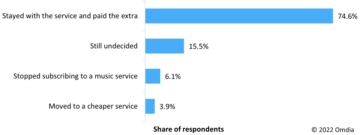 The latest issue of Music & Copyright is now available for subscribers to download. Here are some of the highlights.
The latest issue of Music & Copyright is now available for subscribers to download. Here are some of the highlights.
Shining a light on the impact of recommendation algorithms on the UK music industry
How the likes of Spotify and Deezer recommend music to their users has come under the spotlight in the UK, with the government’s Centre for Data, Ethics, and Innovation conducting a survey to determine how algorithmic recommendations function and what their impact has been on consumers, creators, and other music industry stakeholders. The research found that there was widely held beliefs that the use of algorithms might serve to unfairly advantage certain groups at the expense of others. However, evidence proving or disproving such beliefs was in short supply. The research also concluded that despite efforts by some streaming services to explain how their recommendation technologies worked, there was significant demand from creators, their representatives, and consumers for additional transparency about where the technologies are employed, and how they operate.
Streaming, vinyl, and performance rights gains boost Austrian recorded-music sales
The Austria branch of the IFPI has reported a positive year for recorded-music retail sales, with the total rising for the sixth consecutive year. Much of the growth was driven by streaming, with audio subscriptions generating a sizable majority of the total access service revenue. Spending on physical formats suffered a decline, but the rate of decrease was lessened by higher vinyl sales. Performance rights registered the second-biggest growth rate of the different recorded-music revenue streams, although the collection total has still not returned to prepandemic levels. Pop is the most popular music genre in Austria. Pop accounted for close to two-thirds of the top 100 album sales last year and more than half of the top 100 singles. The genre was also the clear leader for streams served.
The rise of Afrobeats looks set to drag Africa out of the recorded-music wasteland
African music is finally making its mark internationally, with multiple artists from the continent among those nominated for the latest set of Grammys, working with headliners, and providing movie scores. The driving force behind this advance is the West African genre Afrobeats whose genesis also lies in that particular region’s diaspora. In just the last few years, the music has edged into the mainstream, and it’s clear that the genre is set to become well-established. Leading record companies have already signed Afrobeats breakout performers, but they need to do more in African markets to help build music infrastructure and support the development of the music business and emerging artists.
China country report
In addition to the usual set of music industry statistics and news briefs, the latest issue of Music & Copyright includes a detailed China music industry report. China is the world’s most populous country, ending last year with close to 1.5 billion people. Although the population is set to keep rising for the next 10 years or so, the impact of the one-child policy will come into play from 2030 onward, when the population is expected to edge downward. China also has the world’s second-biggest economy, behind the US. For the final quarter of 2022, GDP increased 2.9% compared with the prior year period. For 2021 as a whole, GDP was up 3%, a sharp drop on the 8.1% rise in 2021. China’s relatively buoyant economy is reflected in several sectors of the country’s music industry. Often described as an emerging market, retail sales show the country is more than living up to its long-held potential. China’s digital infrastructure is highly developed, and all the requirements for digital growth are firmly in place. Royalty collections have grown consistently for the last 10 or so years. However, given the size of the population and level of music use, rights holders’ earnings measured at a per capita rate are much smaller than they should be.
If you would like more information about the newsletter or set up a subscription, then send us an email
.wordads-ad-wrapper {display:none;font: normal 11px Arial, sans-serif;letter-spacing: 1px;text-decoration: none;width: 100%;margin: 25px auto;padding: 0;}.wordads-ad-title {margin-bottom: 5px;}.wordads-ad-controls {margin-top: 5px;text-align: right;}.wordads-ad-controls span {cursor: pointer;}.wordads-ad {width: fit-content;margin: 0 auto;}
- SEO Powered Content & PR Distribution. Get Amplified Today.
- Platoblockchain. Web3 Metaverse Intelligence. Knowledge Amplified. Access Here.
- Source: https://musicandcopyright.wordpress.com/2023/02/28/new-issue-of-music-copyright-with-china-country-report-9/
- 1
- 10
- 100
- 2021
- 2022
- a
- About
- access
- addition
- Additional
- advance
- ADvantage
- africa
- African
- Album
- algorithmic
- algorithms
- All
- already
- Although
- among
- and
- Artists
- audio
- Austria
- austrian
- auto
- available
- become
- behind
- Billion
- boost
- Branch
- breakout
- build
- business
- Capita
- centre
- certain
- China
- Chinas
- clear
- Close
- collection
- collections
- COM
- come
- Companies
- compared
- concluded
- conducting
- consecutive
- Consumers
- continent
- copyright
- country
- country’s
- creators
- data
- Decline
- decrease
- Demand
- described
- Despite
- detailed
- Determine
- developed
- Development
- different
- digital
- download
- downward
- driven
- driving
- Drop
- Earnings
- economy
- Edge
- efforts
- emerging
- Ether (ETH)
- ethics
- evidence
- expected
- Explain
- few
- Files
- final
- Finally
- firmly
- Force
- found
- from
- function
- Gains
- GDP
- generating
- Genesis
- given
- Group’s
- grown
- Growth
- Half
- Headliners
- Held
- help
- here
- higher
- highlights
- highly
- How
- However
- HTTPS
- Impact
- in
- includes
- increased
- industry
- information
- Infrastructure
- Innovation
- internationally
- issue
- Keep
- Last
- Last Year
- latest
- leader
- leading
- lessened
- Level
- levels
- light
- living
- LOOKS
- Mainstream
- Majority
- Making
- Margin
- mark
- Market
- Markets
- max-width
- might
- more
- most
- Most Popular
- movie
- multiple
- Music
- music business
- music industry
- Need
- New
- news
- Newsletter
- next
- normal
- operate
- Other
- Others
- particular
- People
- performance
- performers
- period
- physical
- Place
- plato
- Plato Data Intelligence
- PlatoData
- Play
- policy
- pop
- Popular
- population
- positive
- potential
- Prior
- providing
- Quarter
- Rate
- recommend
- Recommendation
- recommendations
- record
- reflected
- registered
- relatively
- report
- Reported
- Representatives
- Requirements
- research
- retail
- Retail Sales
- revenue
- rights
- Rise
- rising
- royalty
- sales
- Sectors
- serve
- service
- Services
- set
- several
- sharp
- Short
- should
- show
- signed
- significant
- Simon
- sixth
- sizable
- Size
- smaller
- So
- some
- Spending
- Spotify
- Spotlight
- stakeholders
- statistics
- Still
- streaming
- streaming services
- streams
- subscribers
- subscription
- subscriptions
- such
- supply
- support
- Survey
- Technologies
- The
- the UK
- The West
- their
- to
- top
- Total
- Transparency
- two-thirds
- Uk
- under
- us
- use
- users
- vinyl
- West
- What
- widely
- will
- WordPress
- worked
- working
- world’s
- would
- year
- years
- zephyrnet












